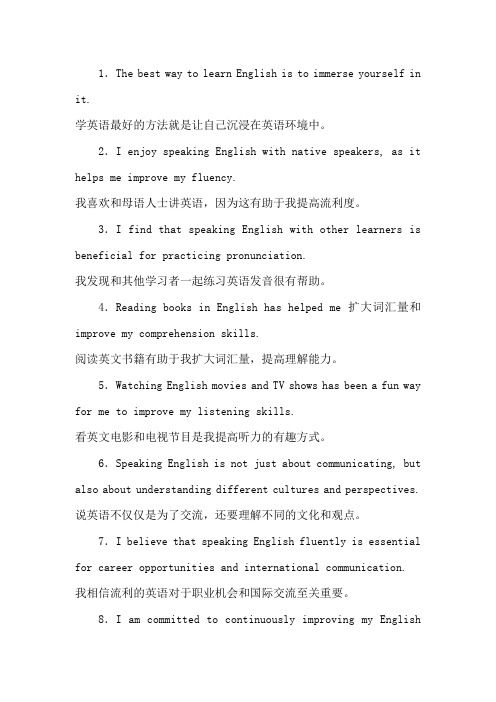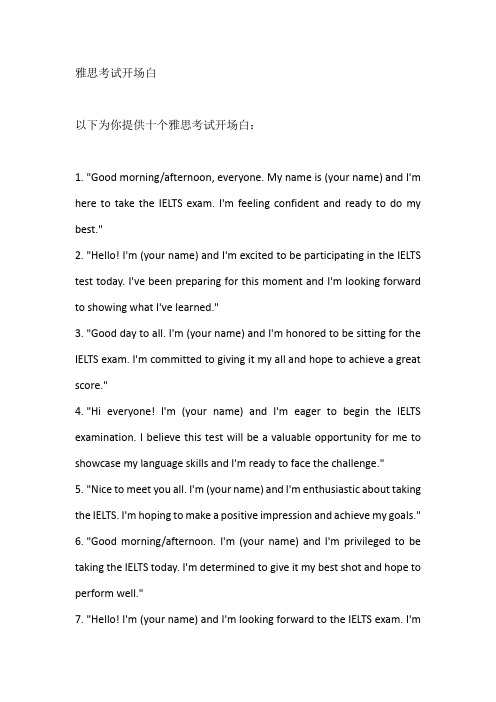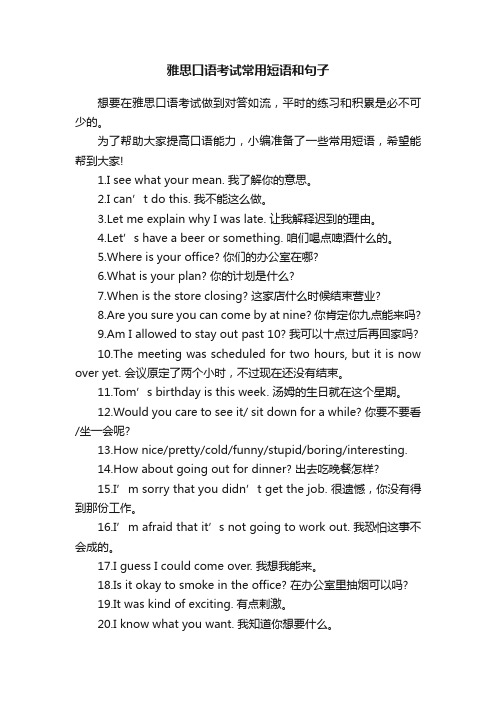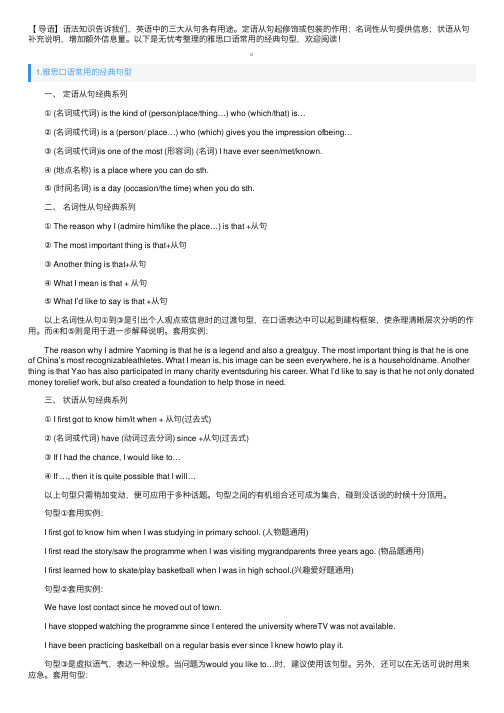雅思口语10个经典句型
雅思 口语 必背 精简

1. What do you think are the main causes of road accidents?2. Do you know what to do in case of emergency?3. Does your name have any special meaning?4. Where were you come from?5. What kind of landscape surrounds your hometown?6. Will your life change a lot after you immigrate to ABC?7. What is the difference between Beijing and your hometown?8. What are the main places of interest in your hometown?9. What is the climate like in your hometown?10. What is the character of the people like in the region where you live?11. What are the differences in accent between the people of your hometown and Beijing?12. What is people"s favorite food in your region?13. How do you make dumplings?14. What do you do during the Spring Festival?15. Why is the Spring Festival so important to Chinese people?16. Can you describe one of the main festivals celebrated in your country?17. Tell me something about the Lantern Festival.18. Tell me something about the Qing Ming Festival.19. Tell me something about the customs of your country.20. How long have you lived in Beijing?21. What is the weather like in Beijing?22. How do you compare the climate in Beijing with that in your hometown?23. What place in Beijing do you like best? Why ?24. Which is the worst place you"ve been to China?25. Which is the best place you"ve been to China?26. What places in Beijing should a foreigner visit? Why?27. What are the major social problems in Beijing? How can they be solved?28. What is the biggest problem China faces?29. What places in Beijing should a foreigner visit? Why?30. Could you tell me something about your family?31. Have you any children?32. What is your child"s name? Does his name have a meaning?33. What does your wife/husband do?34. When did you get married?35. Describe your wedding.36. How have weddings changed in recent years?37. Are there any special customs about wedding in your region?38. Describe a traditional wedding ceremony.39. Where did you go for your honeymoon?40. Did you have to ask for permission from your parents before you got married?41. Is it acceptable for couples to live together without marrying?42. Where do you think a newly couple should live? Living with their parents or on their own?43. What responsibilities should a couple take?44. How do Chinese usually celebrate birthdays?45. Are there any traditions concerning the birth of a baby?46. What kind of parent do you intend to be?47. What do you think of One-Child Policy in China?48. Why do people in China traditionally want to have a son?49. What difficulties do Chinese farmers have concerning their old age?50. What do you think needs to be done in order to relieve the farmer"s worries?51. What hope or fears do you have for your children?52. What sort of culture do you hope your child will grow up in?53. Are you going to bring up your child differently from the way you were brought up? How?54. Do you enjoy shopping?55. Who does most of the shopping in your family?56. What are you good at cooking? What is your favorite dish?57. Who does most of cooking in your family?58. Is there *** discrimination in China?59. How do you sum up women"s conditions in China?60. What are the causes of *** discrimination?61. Should government pay certain salaries to those housewives? Why or why not?62. Would you want your wife to continue with her career or to stay at home taking care of the household after you get married?63. Have you ever wished to be one of the opposite ***? Why (why not)?64. What would you do if your next-door neighbour were noisy nearly all the time?65. Do you have a lot of friend?66. What does friendship mean to you? What kind of people do you make friend with?67. What is your major?68. How do you like your major?69. When and where did you graduate? What qualifications have you obtained?70. Do you still remember your school days?71. What impressed you most when you were at university?72. Which is the best university in your country?73. Could you sum up your own study habits in a few points?74. What do you think of the practice of setting up key schools in primary and secondary school education in China?75. Do you think the subjects you are studying today are relevant to present-day society? Why ?76. What do you think education should be? Should it be a process of learning what is useful for your future life or should it be simply learning for enjoyment? Why?77. What do you do for a living?78. What do you do in the office every day?79. Since your job seems too professional to me, could you explain it in detail?80. What are your job prospects?81. If you had the opportunity to change your job, what would you do with it?82. Do you have any ambitious?83. Will any possible future changes affect your job in any way?84. What are your spare time interests?85. How do you spend your weekends?86. What is your favorite sport? What are the rules?87. What is the most popular sport in your country?88. What are the sporting facilities like in your university/Beijing?89. What do you know about Qigong? Do you believe in Qigong?90. What do you do in your spare time?91. Do you often read newspapers? If not, why ones do you read?92. What do you think of computer?93. Do you think computer has changed our life so much?94. Do you often go to the cinema/theatre?95. What kind of films do you like best?96. Do you often watch TV? What is your favorite program?97. Do you think watching TV too much is a waste of time?98. What kind of music do you enjoy?99. Who is your favorite film star? Will you describe him/her to me?100. Do you enjoy travelling?101. Where have you been travelling to? Which place interested you most? 102. Do you smoking?103. Do you think smoking is a problem that needs special attention and has to be solved? If so, why?104. What do you know about ABC?105. What problem do you think you will have in ABC?106. How will you overcome the difficulties?107. Do you think you will be able to cope with English-demands of your intended study program in ABC?108. What difficulties do you think you’ll encounter in your studies in ABC? 109. Can you imagine what life in Britain/Canada/Australia/London, etc. would be like?110. How will you fare in Britain/Canada/Australia, etc. without your family? 111. What do you intend to study?112. Which university are you going to study at?113. Why did you choose this university?114. Where are you going to study in ABC?115. What are you plans in ABC?116. What is your research proposal all about?117. What do you hope for most from your study abroad?118. Will your study abroad help your job prospects after come back to China? 119. Should you study more theory or do more practice? Give your reasons, please. 120. What kind of differences in the cultures are you expecting between China and the ABC?121. How will your study in Britain benefit your work in China when you come back to China?122. How will your study in Britain benefit your work in China when you come back to China?123. What do you intend to do after you finish studying?124. What will be your main problem when you are study in a foreign country? 125. What problem can you foresee in the future when you come back to China? 126. Will there be any adjustment problems in your life when you come back to China? If so, what are they?127. Will you have to make any changes in your work/life when you come back to China?128. Do you think there will be a gap between your knowledge gained in China and the level of knowledge you are going to encounter on arrival? If so, what will it be? 129. What do you think of the future of China keeps an open policy?130. What do you regard as the most significant events in your country’s recent history?131. Are there any special places you want to see in Canada? What are they? 132. What do you especially want to do in Canada?133. How do you like your life in ABC University?134. What do you think of the training in the university?135. In what way do you think university training is helpful or falls short?136. What aspect of English do you find the most difficult?137. Do you find American English easier to understand than Britain English? 138. What sports are played in your country?139. Could you describe the traditional architecture of your country?140. What role dose religion play in everyday life in your country?141. What would you regard as the most significant events in your country"s recent history?142. How aware do you think people are nowadays about environmental issues? 143. Could you tell me why you chose to study at the university of ABC?144. What role dose tourism play in your country"s economy?145. How serious is unemployment in your country?146. In your opinion, what are the most serious problems associated with modern life?147. What do you think have been the most important changes in your field over the past 5 years?148. What are you going to major in ?149. Are you going to do your own cooking when you are at university?150. Some local students feel that overseas students get preferential treatment. What is your opinion?151. Do you think you will be able to cope with the English-language demands of your intended program?。
好客的人雅思口语

好客的人雅思口语1. Oh, being a hospitable person is just like having a warm, glowing fire in your heart. You know, like my friend Tom. Whenever I visit him,he's all smiles and welcomes me with open arms. He doesn't just say "Hi, come in." He's like, "Man, it's so good to see you! I've been waiting for you all day!" His place is always open for friends, and he makes sure everyone feels at home. It's not just about having a nice house; it's about the feeling he gives you, like you're the most important person in the world at that moment.2. A hospitable person? Well, they're like a ray of sunshine on a cloudy day. Take my neighbor, Mrs. Smith. She's always baking something delicious, and when she sees someone new in the neighborhood, she doesn't hesitate to offer them a slice of her freshly baked pie. She'll say, "Dear, you look like you could use a little something sweet. Try this!" And it's not just the food. She'll sit down and have a long chat with you, as ifshe's known you forever. It's that kind of genuine kindness that makes her so hospitable.3. You know what? A hospitable person is a bit like a magical wizard. My cousin Lily is a great example. Whenever guests arrive at her place, she magically has everything ready. She'll have the comfiest pillows, the softest blankets, and the most interesting stories to share. She'll say, "Guys, this is your home for the time being. Relax and enjoy!" It's like she has this special power to make people feel welcome and at ease, just like a wizard can create a wonderful atmosphere with a wave of their wand.4. A hospitable person is like a big, cozy umbrella on a rainy day. I remember when I was traveling and got caught in the rain. I knocked on a stranger's door, and this amazing guy named Jack opened it. He didn't eventhink twice. He said, "Come on in! You're soaked!" He gave me a towel, made me a hot drink, and we started chatting like old friends. His hospitality was like that umbrella, protecting me from the cold and wet outside and making me feel safe and warm inside his home.5. Being hospitable is like being a friendly tour guide in your ownlittle world. For instance, my aunt Jane. When relatives come to stay with her, she shows them around the town as if it's the most exciting place on earth. She'll say, "Oh, you've got to see this little café. They have the best coffee ever!" And she'll introduce them to all her friends. She makes her guests feel like they're part of the community right away, just like a tour guide would make you feel like you belong in a new place.6. A hospitable person? They're like a beautiful melody that fills the air with warmth. I had a colleague, Mark, who was like that. He ofteninvited us to his place for barbecues. He'd be out there grilling, shouting, "Hey, come and get it! There's plenty for everyone!" He made sure we allhad a great time, laughing and chatting. His hospitality was like that melody that made the whole gathering so pleasant and inviting, somethingyou just wanted to be a part of.7. Oh, a hospitable person is like a treasure chest full of kindness. Let me tell you about my friend Sarah. Whenever someone visits her, she'll dig into her "treasure chest" of goodies. She might bring out a specialbook she thought the guest would like or a unique souvenir from her travels. She'll say, "I saw this and thought of you. I hope you like it!" And her warm welcome and these little surprises make her place a haven for her guests, just like a treasure chest holds valuable things.8. You see, a hospitable person is like a super - friendly bus driveron a journey. I once met a family while traveling. The mother, Carol, wasso hospitable. She shared their food with me on the long bus ride, and she told me all about their adventures. She made me feel like I was part of their family for that short time. She'd say, "We're all in this journey together, so let's make it fun!" Her hospitality was like that bus driver guiding everyone on a pleasant trip, making the journey enjoyable for all.9. A hospitable person is like a big, friendly dog that wags its tail at everyone. My friend Dave is like that. When people come to his house,he's so excited, just like a dog seeing its owner. He'll jump up and say, "It's so great you're here! Let's do something fun!" He'll offer all kinds of entertainment options, from board games to watching movies. His enthusiasm and welcome make his home a really fun place to be, just like a dog's excitement can brighten up your day.10. Being hospitable is like building a bridge between people. I've seen this in my grandpa. He loves having guests over. He'll start conversations, find common interests, and before you know it, strangers become friends. He'll say, "We may come from different places, but here, we're all family." His hospitality creates a connection, just like a bridge links two sides, bringing people closer together.In conclusion, being a hospitable person is all about making othersfeel welcome, comfortable, and valued. It's these small acts of kindness, the warm welcomes, and the sharing that truly define a hospitable person.。
雅思口语好句

1.The best way to learn English is to immerse yourself in it.学英语最好的方法就是让自己沉浸在英语环境中。
2.I enjoy speaking English with native speakers, as it helps me improve my fluency.我喜欢和母语人士讲英语,因为这有助于我提高流利度。
3.I find that speaking English with other learners is beneficial for practicing pronunciation.我发现和其他学习者一起练习英语发音很有帮助。
4.Reading books in English has helped me扩大词汇量和improve my comprehension skills.阅读英文书籍有助于我扩大词汇量,提高理解能力。
5.Watching English movies and TV shows has been a fun way for me to improve my listening skills.看英文电影和电视节目是我提高听力的有趣方式。
6.Speaking English is not just about communicating, but also about understanding different cultures and perspectives. 说英语不仅仅是为了交流,还要理解不同的文化和观点。
7.I believe that speaking English fluently is essential for career opportunities and international communication.我相信流利的英语对于职业机会和国际交流至关重要。
8.I am committed to continuously improving my Englishlanguage skills for personal and professional development. 我致力于不断提升自己的英语水平,以促进个人和职业发展。
雅思考试开场白

雅思考试开场白以下为你提供十个雅思考试开场白:1."Good morning/afternoon, everyone. My name is (your name) and I'm here to take the IELTS exam. I'm feeling confident and ready to do my best."2."Hello! I'm (your name) and I'm excited to be participating in the IELTS test today. I've been preparing for this moment and I'm looking forward to showing what I've learned."3."Good day to all. I'm (your name) and I'm honored to be sitting for the IELTS exam. I'm committed to giving it my all and hope to achieve a great score."4."Hi everyone! I'm (your name) and I'm eager to begin the IELTS examination. I believe this test will be a valuable opportunity for me to showcase my language skills and I'm ready to face the challenge."5."Nice to meet you all. I'm (your name) and I'm enthusiastic about taking the IELTS. I'm hoping to make a positive impression and achieve my goals."6."Good morning/afternoon. I'm (your name) and I'm privileged to be taking the IELTS today. I'm determined to give it my best shot and hope to perform well."7."Hello! I'm (your name) and I'm looking forward to the IELTS exam. I'moptimistic about my chances and I'm going to stay focused throughout the test."8."Good to see you all. I'm (your name) and I'm excited to participate in the IELTS. I've been working hard to improve my language skills and I'm confident that I'll do well."9."Hi there. I'm (your name) and I'm feeling positive about taking the IELTS. I'm going to approach each task with enthusiasm and do my best to showcase my abilities."10."Nice to meet you. I'm (your name) and I'm ready to tackle the IELTS exam. I'm going to stay calm and focused, and I'm confident that I'll be able to perform to the best of my abilities."这些开场白都表达了积极的态度和信心,展示了你对参加雅思考试的热情和准备。
雅思口语考试常用短语和句子

雅思口语考试常用短语和句子想要在雅思口语考试做到对答如流,平时的练习和积累是必不可少的。
为了帮助大家提高口语能力,小编准备了一些常用短语,希望能帮到大家!1.I see what your mean. 我了解你的意思。
2.I can’t do this. 我不能这么做。
3.Let me explain why I was late. 让我解释迟到的理由。
4.Let’s have a beer or something. 咱们喝点啤酒什么的。
5.Where is your office? 你们的办公室在哪?6.What is your plan? 你的计划是什么?7.When is the store closing? 这家店什么时候结束营业?8.Are you sure you can come by at nine? 你肯定你九点能来吗?9.Am I allowed to stay out past 10? 我可以十点过后再回家吗?10.The meeting was scheduled for two hours, but it is now over yet. 会议原定了两个小时,不过现在还没有结束。
11.Tom’s birthday is this week. 汤姆的生日就在这个星期。
12.Would you care to see it/ sit down for a while? 你要不要看/坐一会呢?13.How nice/pretty/cold/funny/stupid/boring/interesting.14.How about going out for dinner? 出去吃晚餐怎样?15.I’m sorry that you didn’t get the job. 很遗憾,你没有得到那份工作。
16.I’m afraid that it’s not going to work out. 我恐怕这事不会成的。
雅思口语之描述长相的表达和句型

雅思口语之描述长相的表达和句型1.He/She has a round/oval face with a prominent nose and ears.他/她有着圆润/椭圆形的脸庞,高挺的鼻子和耳朵。
2.He/She has a tall/short figure with broad/narrow shoulders and a slim/athletic waist.他/她有着高挑/矮小的身材,宽阔/狭窄的肩膀和纤细/健硕的腰身。
3.He/She has long/short hair with a widow's peak/a widow's peak that slopes to the right/left.他/她的头发又长又短,有着一个秃顶的额头或额头向右/左倾斜。
4.He/She has big/small eyes with long/short eyelashes and a prominent/sunken nose.他/她有着大大的/小小的眼睛,长长短短的睫毛和突出/凹陷的鼻子。
5.He/She has a big smile with even teeth and dimples on his/her cheeks when he/she laughs.他/她笑起来时有着大大的笑容,整齐的牙齿和脸颊上的酒窝。
6.He/She has a friendly/warm/attractive appearance that makes people feel comfortable aroundhim/her.他/她有着友好/温暖/迷人的外表,让人们在他/她身边感到舒适。
7.He/She looks smart in his/her suit/business attire with a tie that matches his/her shirt.他/她穿着西装/商务装,系着与衬衫相配的领带,看起来很聪明。
雅思口语常用的经典句型

【导语】语法知识告诉我们,英语中的三⼤从句各有⽤途。
定语从句起修饰或包装的作⽤;名词性从句提供信息;状语从句补充说明,增加额外信息量。
以下是⽆忧考整理的雅思⼝语常⽤的经典句型,欢迎阅读!1.雅思⼝语常⽤的经典句型 ⼀、定语从句经典系列 ① (名词或代词) is the kind of (person/place/thing…) who (which/that) is… ② (名词或代词) is a (person/ place…) who (which) gives you the impression ofbeing… ③ (名词或代词)is one of the most (形容词) (名词) I have ever seen/met/known. ④ (地点名称) is a place where you can do sth. ⑤ (时间名词) is a day (occasion/the time) when you do sth. ⼆、名词性从句经典系列 ① The reason why I (admire him/like the place…) is that +从句 ② The most important thing is that+从句 ③ Another thing is that+从句 ④ What I mean is that + 从句 ⑤ What I’d like to say is that +从句 以上名词性从句①到③是引出个⼈观点或信息时的过渡句型,在⼝语表达中可以起到建构框架,使条理清晰层次分明的作⽤。
⽽④和⑤则是⽤于进⼀步解释说明。
套⽤实例: The reason why I admire Yaoming is that he is a legend and also a greatguy. The most important thing is that he is one of China’s most recognizableathletes. What I mean is, his image can be seen everywhere, he is a householdname. Another thing is that Yao has also participated in many charity eventsduring his career. What I’d like to say is that he not only donated money torelief work, but also created a foundation to help those in need. 三、状语从句经典系列 ① I first got to know him/it when + 从句(过去式) ② (名词或代词) have (动词过去分词) since +从句(过去式) ③ If I had the chance, I would like to… ④ If …, then it is quite possible that I will… 以上句型只需稍加变动,便可应⽤于多种话题。
雅思口语中的经典句型

【导语】要想在雅思⼝语考试中取得好成绩,就离不开⽇常的积累。
也要多了解⼀些雅思⼝语常⽤句型,然后多背诵、练习。
以下是⽆忧考整理的雅思⼝语中的经典句型,欢迎阅读!1.雅思⼝语中的经典句型 1. I am a student studying in Wuhan University, and I major in Computer Science. 我是武汉⼤学的学⽣,我的专业是计算机科学 2. I chose my major because I thought it was popular, so it will be easier for me to find a job after graduation. 我之所以选择这个专业,是因为我觉得它很热门,毕业以后我会⽐较容易找到⼀份好⼯作。
3. I came from Hubei province. 我来⾃湖北省。
4. I love my hometown because there are a lot of places of interest and delicious food here. 我喜欢我的家乡,因为这⾥有许多的名胜古迹,还有各种各样的美⾷。
5. The most famous attraction is Yellow Crane Tower. It was built hundreds of years ago besides the Yangtze River. 最出名的旅游景点是黄鹤楼,⼏百年前它被建于长江边。
6. Every year millions of tourists visit the tower coming from different parts of China. 每年都有⼏百万来⾃于全国各地的游客参观黄鹤楼。
7. And the most welcomed snack is the hot dry noodle, even though some outlanders do not appreciate it at the beginning, they will love it finally. 的⼩吃是热⼲⾯,虽然有⼀些外地来的⼈刚开始并不喜欢吃,但是⼀段时间以后他们会爱上热⼲⾯。
- 1、下载文档前请自行甄别文档内容的完整性,平台不提供额外的编辑、内容补充、找答案等附加服务。
- 2、"仅部分预览"的文档,不可在线预览部分如存在完整性等问题,可反馈申请退款(可完整预览的文档不适用该条件!)。
- 3、如文档侵犯您的权益,请联系客服反馈,我们会尽快为您处理(人工客服工作时间:9:00-18:30)。
环球雅思口语老师带给大家十套口语常用的句型,分别介绍了:表达喜好、叙述、比较和对比、建议、表达观点、解释、推测、分析、总结、修正;篇幅不长,但恰到好处,牢记无论对考试还是日常交流,都会有帮助滴!
1. 表达喜好? I prefer A to B because...? If I have a choice, I will... (a real possibility)? If I had a choice, I would... (not a real possibility, just wishing)? For me, A is much more attractive / interesting / preferable than B because...? I would much rather do / have / eat / listen to / blah blah blah A than B...
2. 叙述? When I was a high school student, I went to Guizhou to visit some friends.? After I graduated from high school, I ...? During my visit to Guizhou last year, I...? Last year during the Spring Festival, I went to Guizhou to visit some friends.(Also use "Whenever" or "While")
3. 比较和对比? A is much better / worse than B.? A is not nearly as good as B.? A is not quite as important as B.? A is almost as tall as B, but not quite.? When I compare these two items, it's clear that...
4. 建议? Maybe, Perhaps, Possibly? One possibility that I can think of is...? Another idea to think about is...
5. 表达观点? It seems to me that...? This is only my opinion but...? After a lot of thought, I have come to the conclusion that...? I've never thought about this question much before, but it seems to me that...
6. 解释? The reason I believe this is...? The most important evidence supporting my belief is...
7. 推测? I'm not sure what might happen, but one possibility is...? It's hard to predict the future, but I suppose it / we might...
8. 分析? There are several points to consider, first of which is...? We can break this question down into several parts. First...? Let's look at this step by step. To begin with...
9. 总结? Altogether, there were...? In the end, they had to...? When we consider all the factors...? Considering all of these ideas, maybe the best thing would be to...
10. 修正? Maybe I'm not making myself clear. I want to say that...? What I mean to say is...? What I'm trying to say is...? Another way to put it is...。
